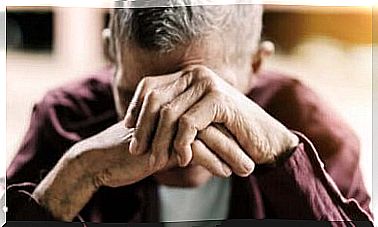What Does Post-traumatic Development Really Mean?

No one wants to have to experience negative situations in their life. But sooner or later we will all be confronted with our own painful experiences. The experience is devastating for some people and it can even lead to health problems. But the same type of situation can help others to a post-traumatic development. A type of growth that changes their lives in a positive way.
It is difficult to imagine how an emotional trauma can contribute to something positive. Nevertheless, many people succeed in overcoming adversity of this kind, and thus experience a real personal transformation. But what exactly is post-traumatic development, and what are the determining factors for it?

Post-traumatic development
Post-traumatic development can be defined as the positive changes you experience as a result of the struggle you went through during a traumatic event.
This is not just about the fact that a man can overcome a negative experience without developing lasting harm, and then return to his original state. Post-traumatic development also involves a thorough transformation of how one perceives oneself.
Thus, after a negative experience, there are obvious and clear changes in the person’s perspective:
- The situation causes the affected individual to somehow re-evaluate his life, and this creates a change in his priorities.
- These people’s social relationships become more intimate and warm. They create stronger bonds with others in the face of adversity, and suffering helps them develop empathy and compassion. This happens, for example, in parents whose children have serious illnesses. Many of these parents experience that they feel more intimate ties between each other, and are more united because they shared this experience together.
- The affected individual experiences an increased sense of personal strength. Thus, the traumatic event leads to a significant increase in the individual’s self-confidence and his ability to cope with future adversity.
- In addition, they discover and learn new opportunities and paths in life. This often happens to people who have been through a severe and oppressive life situation. It also finds opportunities to redirect its life after the negative experience.
- Finally, there is also a spiritual development. There is a change in the moral perception and spirituality. They reconsider their values, and develop a more transcendent life perspective.
A transforming process
Note that this does not happen from one moment to the next, and that it does not happen by chance or due to luck. Post-traumatic development is the result of profound individual restructuring. The traumatic experience leads to the destabilization of the most inherent paradigms and cognitive perceptions. The perception one has of how the world works is shaken, and the perception of life’s meaning and significance is challenged.
Thus, when it comes to meeting the new and painful reality, a process of deconstruction and reconstruction of perspectives and assumptions begins. This leads to more positive and better functioning assumptions. This is because we all experience post-traumatic development differently. It is a journey of profound change.
But it is not a painless path. Stress and negative emotions are manifested and are then present throughout the process. Incidentally, this is an indispensable element for growth to take place. So what is it that makes some people adapt and emerge from adversity as stronger individuals, while others fall into a dark abyss with all its consequences?

How to handle adversity properly
Much of the difference lies in what personality and what temperament you have. Not everyone carries the same degree of optimism, positivity and resilience. Human genetics and the environment are in all probability what shape our various characteristics and abilities.
Thus, some people are more likely than others to resort to more useful and functional management methods. Studies show that those who reflect on life and express their feelings experience post-traumatic development to a greater degree.
It follows that if your current strategies for dealing with adversity lead you to experience pain, and you feel helpless; consider changing your style. Everyone can develop functional skills that lead them to increased self-confidence and optimism. Although you can not prevent being affected by negative or painful events, you can benefit from post-traumatic development and learn something from each of your unpleasant experiences.









